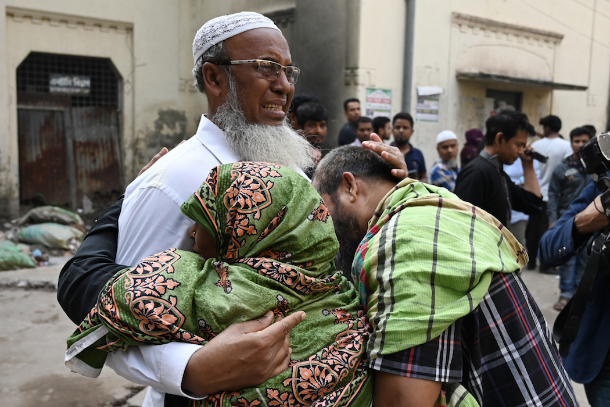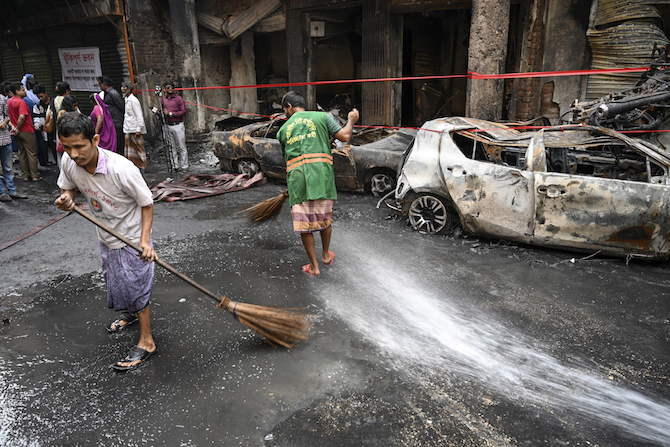Critics say Bangladesh moving too slowly to relocate chemical plants from urban areas as 70 perish in latest disaster

Relatives of victims who were killed in a fire mourn in Dhaka on February 21. At least 69 people died in a huge blaze that tore through apartment buildings also used as chemical warehouses in an old part of the Bangladeshi capital Dhaka. (Photo by Munir Uz Zaman/AFP)
Stephan Uttom and Rock Rozario, Dhaka
Bangladesh
March 1, 2019
Muhammad Asif had to search and wait frantically for nearly 24 hours before he was able to spot and identify the body of his father at Dhaka Medical College Hospital (DMCH) after a deadly blaze tore through the Chawk Bazar area on the night of Feb. 20.
His father, 52-year-old Muhammad Jummon, was one of 70 people who perished in the blaze. Dozens more were injured and hospitalized.
Asif and his four brothers were devastated, as were the families of the other people who died.
But devastating fires are not uncommon in Bangladesh, where health and safety laws are often violated to serve the interests of business seeking greater profit with scant regard for human life, rights defenders claim.
Asif blamed “greedy businessmen” and complicit local authorities for the irreparable loss his family has suffered.
“Unscrupulous businessmen frequently store and use hazardous chemicals in residential areas, and government agencies have turned a blind eye to this for years,” he told ucanews.com.
“It doesn’t matter how many fires and deaths there are, nothing changes. Greed and negligence have destroyed many people’s lives and dreams,” he said.
The cause of the fire at the bazaar was still being investigated nearly two weeks after it spread through the area, rapidly engulfing apartment buildings that were used to store chemicals and leaving gutted shells in its wake.
Police suspect it was started by an explosion at a chemical warehouse on the ground floor of a five-storey building. That may have been triggered by a gas cylinder or a faulty transformer. A probe is underway.
The initial spark triggered a chain reaction as it tore through the warehouse and residential units where highly flammable materials had been deposited, as well as torching shops, restaurants and vehicles on adjacent narrow streets.
Among the dead, 19 bodies have yet to be identified because they were so badly charred. Officials at the DMCH have collected DNA samples from family members who failed to recognize their loved ones among the corpses.
Jummon used to oversee production at a spice factory in the area. Asif said his father had followed his customary routine that day of going to meet an old friend there for some tea when all hell broke loose.
“The fire broke out and they were unable to escape from the shop …” the 28-year-old said, trailing off as he was overcome with emotion.
His father served as the main breadwinner for the family of seven, which has left them in dire straits financially.
“I’m the only other member of my family who has a job as my brothers are all students,” Jummon said.
“It was my father’s dream that one of his sons would become a government official one day. Now we don’t know whether we can fulfill his dream.”
Nasrin Begum, 30, also lost her father, 65-year-old Joynal Abedin. The Muslim father of four had operated a construction material business selling iron rods, cement and sand in the Chawk Bazar area for years.
Unfortunately, when the fire broke out, he was at its epicenter. His body sustained horrific injuries.
“At the hospital, we were shocked when we saw him,” Nasrin said.
“His stomach had been ripped open by the blast and his legs torn off. We could only identify him by a piece of shirt and his wristwatch,” she added.
“We had to bury him quickly and an open coffin was out of the question.”
Nasrin said Abedin had toiled for years to build a new house for the family. The government should have put safeguards in place and properly enforced them to ensure his father got to enjoy the fruits of his labor, she argued.
“He was an honest and hardworking man. He was like an umbrella for all of us. But his untimely death deprived him of a happy and peaceful retirement,” Nasrin said.
She said her father often commented about how dangerous it was to allow chemical factories and warehouses to commingle with residential buildings.
“He complained to the police repeatedly that dangerous chemicals were being stored here illegally. But because those businessmen are so rich and wield so much influence, the police never paid any heed,” Nasrin said.
“We aren’t seeking any compensation from the government. We just want to see all these chemicals removed from the area so this kind of tragedy never happens again.”

Relatives of victims give blood for DNA matching with undefined dead bodies following a fire in Dhaka, Bangladesh’s capital city, on Feb. 22. (Photo by Munir Uz Zaman/AFP)
Greed, negligence and disaster
The bazaar fire was the second tragedy to smite Bangladesh last month.
On Feb. 17, another nine people died and dozens more were injured after a fire razed 200 slum dwellings in the southeastern port city of Chittagong.
Previous blazes that could have been prevented have taken an even higher toll.
In 2012, about 110 workers died after the Tazreen Fashions garment factory caught fire in the Ashulia industrial belt of Dhaka.
Two years before that, an explosion at a chemical warehouse in the Nimtoli area of Dhaka saw 124 people perish in a deadly blaze.
That triggered a massive public outcry with local people demanding the chemical warehouses be relocated away from Old Dhaka.
The ruling Awami League government responded by promising it would find new home for 800 chemical warehouses, but failed to keep its pledge.
Dhaka has been estimated to house about 1,000 chemical factories that have long been regarded as a ticking time bomb. Around 850 are operating illegally, according to the environmentalist group Poribesh Banchao Andolon.
Belayet Hossain, chairman of the Bangladesh Chemical and Perfumery Merchant Association, said the tragedy at Chawk Bazar claimed it was a cosmetics warehouse that caused the fire to get out of control.
“The explosion resulted from a gas cylinder blast and the fire spread to a cosmetics warehouse. It was not a chemical storage warehouse,” he said.
“Most of the hazardous chemicals warehouses have already moved out of Dhaka, but we are being scapegoated, and those who are really responsible are trying to blame us to serve their own interests,” he added.
But he conceded there is still a problem with unregistered warehouses that store dangerous chemicals, and claimed corrupt officials at entry ports provide a gateway for the inflow of illegal chemicals into the country
“Those illegal warehouses and factories must be closed down and the illegal importing of chemicals has to stop,” Hossain said.
“We have said time and again that if the government allocates us plots in industrial estates, we will make sure all the factories and warehouses move there.”

Bangladeshi men clean the wreckage following the fire on Feb. 22. (Photo by Munir Uz Zaman/AFP)
The government has been working to shift the chemical industry out of Dhaka, said Saiful Alam, a project director at the state-run Chemical Industrial Estate, which falls under the Ministry of Industries.
“We have a list of 900 chemical plants and warehouses in Old Dhaka and we have been working to move them out of the city to a designated industrial estate since 2016,” he said.
“The project has been delayed due to a lack of cooperation from local businessmen who are unwilling to move, amid unrealistic demands for compensation packages.”
The government has decided to move the industry to Keraniganj, a suburb of Dhaka on the other side of the Buriganga River.
Regardless of its intentions, the government’s negligence in this matter is unacceptable, said Syeda Rizwana Hasan, a Supreme Court lawyer and chief of the Bangladesh Environmental Lawyers Association.
“There is a strong connection between profiteering businessmen and greedy politicians,” she said.
“Government negligence further ignites this greed. This must stop after the loss of so many innocent lives.”
The article appeared in the ucanews.com/news on 4 March 2019
